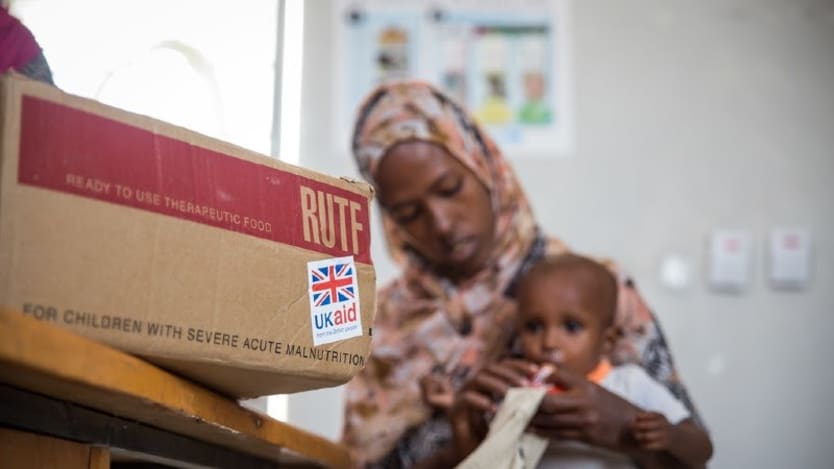
In November 1994, we stood outside the U.K. High Court, surrounded by TV cameras and jubilant activists from our small but determined campaign group, the World Development Movement. It was hard to take in the David vs. Goliath win we had just achieved. Judges had ruled that the U.K. government’s use of £234 million of British aid to fund the Pergau Dam in Malaysia — in exchange for a major arms deal — was illegal.
UK aid to be cut by £2.9B this year
The almost 20% ODA cut comes as the U.K. grapples with the economic fallout of the coronavirus pandemic.
The victory was a fatal blow to the Aid and Trade Provision, which helped British companies win contracts abroad. It also played its part, along with long-running campaigns, in a law making cutting global poverty British aid’s central aim and in the founding of a strong, independent Department for International Development separate from the Foreign & Commonwealth Office.
All those achievements are now under attack. In June, the government revealed it would absorb DFID back into the Foreign Office. A growing amount of the aid budget is now spent by other government departments, including the Department for International Trade. And this month, on the final sitting day of Parliament before the summer recess, the government announced cuts to the aid budget of 20%, or around £2.9 billion ($3.8 billion).
We know what civil society must now do to rescue U.K. aid policy. After all, civil society has won this battle before. To win again, NGOs must draw on the lessons of past victories, rediscover their roots in U.K. communities, and earn public support with a new argument for aid — one framed by global common interests.
The Pergau Dam case revealed how corporate lobbyists, arms dealers, and a secret aid-for-arms deal involving former Prime Minister Margaret Thatcher lay behind the project. Funding the dam was not an aberration; we believe it represented the Thatcher government’s view of aid, foreign policy, and “British interests” in particular — specifically, that these begin and end with the bolstering of Britain’s military and economic power.
We must show that good aid is not simply altruism or charity but part of a collaborative global strategy for building a safer and more just, prosperous, and sustainable world.
—The merging of DFID into the Foreign Office is justified by today’s government through the same arguments. But weapons and export deals will not address challenges such as COVID-19 and climate change or tackle the root causes of the poverty and conflict that drive people from their homes to seek sanctuary in Europe.
As we battle the pandemic and prepare for next year’s critical COP 26 climate talks in Scotland, we should strengthen the United Kingdom’s role in global strategies to simultaneously address these interlocking challenges. But it is no good just decrying the merger or appealing to a lost liberal consensus on aid in a time of nationalist populism. NGOs must learn lessons, understand our changed times, and reflect on strategy.
Recent history gives us hope. It was a long, hard battle to secure Britain’s poverty-focused aid program and commitment to spend 0.7% of national income on aid, something finally enshrined in law in 2015. NGOs led the way, with support from faith groups to trade unions. Unite and we can win again.
But we must also reflect on whether this hard-won progress made NGOs complacent and too cozy with the powerful. Did we take the gains too much for granted? As contracted deliverers of government aid — no matter how good — did NGOs become part of a global establishment all too easy for the growing ranks of populist politicians to attack?
We did not do enough to sustain support for aid at a community level in the U.K. As big NGOs lobbied in New York and Geneva, their networks in Britain were wound down and local education centers on global issues were allowed to wither on the vine. Campaigns shifted to supporters clicking on centralized online petitions, and NGOs took their eye off the importance of local connections presenting the international case.
All this came as newspapers weaponized attacks on aid to fuel the populist surge. So it is encouraging to see a resurgent NGO focus on movement-building, one that nurtures local activists and links issues such as climate change and poverty.
Finally, we need to be better at setting out a compelling argument for aid, framed within a wider political narrative. We must show that good aid is not simply altruism or charity but part of a collaborative global strategy for building a safer and more just, prosperous, and sustainable world that is better for all of its citizens — including those in the U.K.
We must show how contributing to worldwide efforts to address poverty and environmental destruction head-on also tackles root causes of the climate change, conflict, ingrained racism, forced migration, and grotesque international inequalities that plague ordinary people across rich and poor nations alike.
The coming months will bring the government’s delayed integrated review of security, defense, development, and foreign policy and take us closer to those crucial COP 26 climate talks. The U.K. faces a decisive moment in casting our international vision.
In doing so, we must learn the grim lessons of the coronavirus. This global challenge has no respect for borders. Rich nations and mighty armies have been powerless to stop it. Instead, cooperation has been our greatest weapon — in our communities, across nations, and internationally.
Now the battles for climate action, global justice, and the end of poverty come together in a campaign to “build back better” after the pandemic. It is a cause that unites NGOs and campaigners of all stripes. So while the DFID merger is a bitter reverse, it can also be the spur to fight back better.









